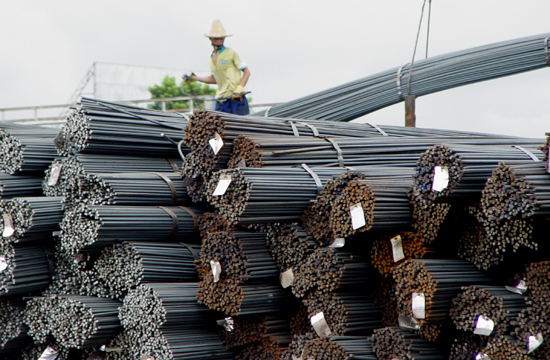|
 |
|
Reinforced steel rods in Haikou, Hainan province. The National Development and Reform Commission recently approved 60 projects, including 25 for rail transport and 11 for infrastructure. [Photo/China Daily] |
A new report has outlined just what a massive boost could be given to China's ailing steel industry from the recent approval of 60 new projects worth more than 1 trillion yuan ($157.8 billion) by the National Development and Reform Commission.
Since the announcement last week, steel-related stocks have risen, and analysts are suggesting that the rail transport, warehousing and road construction projects have come at a vital time for the steel industry, which is suffering one of its worst ever downturns.
China's top economic planning agency has given the green light to 25 rail transport projects, 20 other transport and warehousing projects, and 11 infrastructure projects, among others.
The NDRC said it estimates that every 100 million yuan invested in urban transport facilities, for instance, will generate about 10,000 metric tons of demand for steel used in rails, stations and other equipment.
According to the report on the website of the China Iron and Steel Association, investment in transportation facilities and road projects alone will exceed 840 billion yuan.
It adds that the transport content of the projects, as a result, is expected to generate demand for at least 84 million tons of steel products - a much-needed boost at a time when China's output of crude steel slipped to 58.7 million tons in August, down 1.7 percent year-on-year, according to the National Bureau of Statistics on Tuesday.
However, analysts remain cautious about the immediate effect of the projects on a steel industry being squeezed hard by falling prices and mounting inventories.
"The new projects will not play such a significant role as the 4 trillion yuan investment into the nation's infrastructures back in 2008 and 2009, as the economic background is quite different now," said Zeng Jiesheng, an analyst from Mysteel.com, a steel industry information provider.
He added that launching the projects will require a lot of capital, but debt-stricken local governments could find it hard to get credit from commercial banks, given recent reports of the persistent debt burdens that local governments find themselves laboring under.
Zeng's caution was echoed by Wang Guoqing, deputy director of the Lange Steel Information Research Center, an industrial consultancy based in Beijing, who emphasized that the expected demand for steel to be brought about by the projects will only be gradual.
The new projects are scheduled to start construction this year and last until 2020, so the industry will have to be patient to see any real effects, added Wang.
However, according to Zeng, the expected slow release of demand will also be good for the industry.
"The last wave of infrastructure investment did pick up the economy immediately - but it generated a negative effect, in that the lavish spending on infrastructure and property has only led to a severe overcapacity of many industries including the steel industry," he noted.
China's crude steel output was 500.49 million tons in 2008, but the amount surged to 683.88 million tons in 2011, up 36.64 percent within three years, according to Lange Steel figures.
Wang Xiaoqi, CISA's vice-chairman, was quoted as saying on Xinhuanet.com in late August that the industry has entered one of the most difficult times in its history, with steelmakers earning just 1.68 yuan for every ton of steel they produce, according to the average price for the first seven months of this year.
Of the 80 steelmakers tracked by CISA, 30 fell into the red in the first seven months, with losses totaling 1.7 billion yuan.
